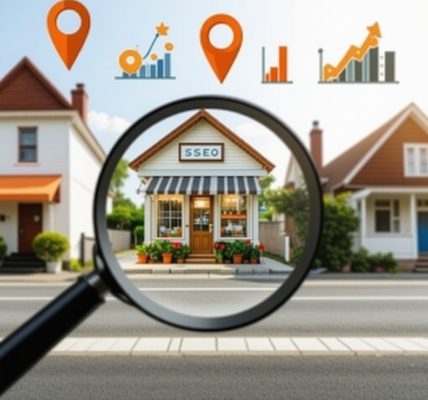Understanding Local SEO in 2025
As we step into 2025, the landscape of local SEO continues to evolve, making it crucial for businesses to keep pace with the latest trends and best practices. With the increasing reliance on Google Business Profiles and local search results, many business owners find themselves with questions about how to effectively optimize their online presence. In this article, we will address the most common local SEO FAQs to help you navigate this competitive space successfully.
What is Local SEO and Why is it Important?
Local SEO refers to the process of optimizing your online presence to attract more business from relevant local searches. This optimization ensures that your business appears in local search results on platforms like Google, particularly in the local 3-pack, which showcases top businesses based on geographic relevance. Businesses that effectively leverage local SEO strategies stand to gain increased visibility, more foot traffic, and ultimately, higher sales.
How Do Google Business Profiles Influence Local SEO?
Your Google Business Profile is a critical component of your local SEO strategy. It allows you to manage how your business appears on Google Search and Maps, providing essential information such as your location, hours of operation, and customer reviews. Keeping your profile updated and optimized is key to improving your local search rankings. For detailed steps on optimizing your profile, check out our guide on how to optimize your Google Business listing effectively.
What Factors Affect Local Search Rankings?
Several factors influence your local search rankings, including:
- Relevance: How well your business matches the search intent of users.
- Distance: The proximity of your business to the searcher’s location.
- Prominence: The overall reputation of your business based on reviews, citations, and backlinks.
By focusing on these factors, you can enhance your visibility and attract more local customers.
How Can I Improve My Local SEO Strategy?
Improving your local SEO strategy involves a combination of tactics:
- Optimize Your Google Business Profile: Ensure your profile is complete with accurate information, high-quality images, and regular updates.
- Gather Customer Reviews: Positive reviews can significantly impact your local rankings and credibility. Learn more about how reviews affect your local SEO rankings.
- Utilize Local Keywords: Incorporate location-based keywords into your website content to improve relevance.
- Build Local Citations: Ensure your business is listed in relevant local directories and maintain consistency across all platforms.
By implementing these strategies, you can effectively enhance your local SEO efforts and position your business for success in 2025.
Leveraging Local SEO Tools for Effective Optimization
To enhance your local SEO efforts, utilizing specialized tools can make a significant difference. Tools such as GMB SEO tools help streamline various optimization aspects, from keyword research to performance tracking. By harnessing these tools, businesses can gain insights into their ranking performance and identify areas for improvement.
Keyword Research for Local SEO
Effective keyword research is the backbone of any successful local SEO strategy. By identifying high-performing local keywords, you can better tailor your content to meet the needs of your target audience. Use tools to discover long-tail keywords that reflect local intent, such as “best Italian restaurant in [Your City].” This approach not only boosts your relevance but also aligns with user search behavior.
Building and Managing Citations
Citations play a crucial role in local search visibility. They are mentions of your business name, address, and phone number (NAP) across various online platforms. Ensure your business is consistently listed in reputable directories. Inconsistencies can lead to confusion and impact your local rankings. For assistance, explore our post on effective GMB citation management.
Engaging with Customers Through Reviews
Customer reviews are a vital aspect of your local SEO strategy. Not only do they influence potential customers, but they also significantly impact your search rankings. Encourage satisfied customers to leave positive reviews on your Google Business Profile and other platforms. For more insights on this topic, read about how reviews affect your local SEO rankings.
Responding to Reviews
Engaging with customers through reviews demonstrates that you value their feedback. Responding to both positive and negative reviews can enhance your reputation and build trust. This interaction also signals to search engines that your business is active and engaged, which can positively influence your local SEO rankings.
Utilizing Social Media for Local SEO
Social media platforms can also be leveraged to enhance your local SEO strategy. Regularly posting content that resonates with your audience can drive traffic to your website and improve brand visibility. Share updates about your business, promotions, and community involvement to foster engagement. When combined with SEO efforts, social media can amplify your reach and drive more local traffic.
Local Content Marketing
Content marketing is another effective way to boost your local SEO. Creating blog posts, videos, and infographics that address local interests can attract more visitors to your site. For example, consider writing about local events, tips for visitors, or guides to your city. Not only does this enhance your credibility, but it also positions your business as a local authority. Explore our strategies on effective local SEO strategies for additional ideas.
Implementing Local SEO Strategies for Increased Traffic
To further enhance your business’s online presence, implementing targeted local SEO strategies is essential. These strategies not only improve your visibility in local search results but also attract more targeted traffic. By focusing on strategies that cater to local audiences, you can boost your engagement and conversion rates significantly.
Optimizing Google Business Profile
Your Google Business Profile is a crucial asset for local SEO. Ensure that all information is accurate, including your business hours, phone number, and address. Regularly update your profile with fresh content, such as posts about promotions or events, which can enhance engagement and improve your search rankings. For detailed tips, check out our guide on optimizing your Google Business listing effectively.
Leveraging Local Keywords
Incorporating local keywords into your website content is vital for attracting local customers. Research and implement keywords that reflect local search intent, such as “best coffee shop in [Your City]” or “affordable plumbing services near me.” Tools that assist with keyword research can help you identify the most effective terms to include in your content strategy.
Creating Localized Content
Developing localized content not only improves your search engine rankings but also resonates with your audience. Write blog posts about local events, news, or community highlights that establish your business as a local authority. Engaging with the community through your content can foster trust and encourage more visits to your site. For more on content strategies, explore our post on effective local SEO strategies.
Utilizing Local Backlinks
Building backlinks from local businesses and organizations can significantly enhance your website’s authority. Collaborating with local influencers or sponsoring community events can provide valuable backlinks that boost your SEO ranking. Make sure to pursue opportunities that align with your business values and engage with your community meaningfully.
Monitoring and Analyzing Your Local SEO Efforts
Constantly monitoring your local SEO performance is imperative to ensure your strategies are effective. Use tools to track your website’s traffic, engagement rates, and keyword rankings. Analyzing this data will enable you to refine your approach and make informed decisions. For a comprehensive understanding of how to audit your local SEO performance, read our article on GMB SEO audit.
Adapting to Changes in Local SEO
The landscape of local SEO is continually evolving. Stay informed about the latest trends and algorithm changes that may impact your rankings. Engage with industry blogs, attend webinars, and connect with local SEO experts to gain insights that can help you adapt and thrive in this dynamic environment.
Establishing a Strong Local Presence Online
To fully capitalize on local SEO, creating a robust online presence is vital. This means not only having an optimized Google Business Profile but also ensuring your website is a trusted source of information for local customers. An effective online presence helps in building credibility and attracting the right audience.
Engaging with Local Customers through Social Media
Utilizing social media platforms can significantly enhance your local engagement. Sharing updates, promotions, and community involvement on platforms like Facebook, Instagram, and Twitter allows you to connect directly with your audience. Consider creating posts that highlight local events or customer testimonials to foster community engagement.
Encouraging Customer Reviews
Customer reviews play a crucial role in local SEO. Positive feedback can enhance your business’s reputation and attract new customers. Encourage satisfied clients to leave reviews on your Google Business Profile and other review platforms. For tips on generating more reviews, check out our guide on GMB review generation best practices.
Utilizing Local SEO Tools for Better Insights
In the realm of local SEO, leveraging tools can provide you with valuable insights into your performance. Tools like Google Analytics and Google Search Console can help you track your website traffic and understand user behavior. Additionally, using local SEO tools can help you identify keyword opportunities and monitor your competition.
Implementing Schema Markup for Local Businesses
Schema markup is a powerful tool for enhancing your local SEO efforts. By adding structured data to your website, you can help search engines understand your business better, which can improve your visibility in search results. Implementing local business schema can provide search engines with information like your business’s name, address, phone number, and operating hours, making it easier for potential customers to find you.
Building a Mobile-Friendly Website
In today’s mobile-centric world, having a mobile-friendly website is essential for local SEO. A responsive design ensures that your website is accessible and easy to navigate on various devices, improving user experience. Additionally, Google prioritizes mobile-friendly sites in local search results, so optimizing your site for mobile users can significantly boost your rankings.
Measuring Your Local SEO Success
To gauge the effectiveness of your local SEO strategies, regularly measure your results. Analyze metrics such as organic traffic, bounce rates, and conversion rates to evaluate how well your strategies are working. Adjust your approach based on these insights to ensure continuous improvement and growth. For more detailed guidance on tracking your Google Business performance, read our post on how to track Google Business performance effectively.
Comprehensive FAQ Section on Local SEO
What is local SEO and why is it important for small businesses?
Local SEO refers to the optimization strategies that help businesses become more visible in local search results. It is crucial for small businesses as it increases their chances of being discovered by local customers, driving foot traffic and sales.
How can I optimize my Google Business Profile for better local SEO?
To optimize your Google Business Profile, ensure that all information is accurate and complete. Include your business name, address, phone number, hours of operation, and engaging photos. Regularly update posts and respond to customer reviews to enhance your visibility.
What are the best local SEO tools I should use?
Some of the best local SEO tools include Google Analytics, Google Search Console, Moz Local, and BrightLocal. These tools help track performance, manage listings, and analyze competitors, providing valuable insights for improvement.
How do customer reviews impact local SEO?
Customer reviews significantly impact local SEO by influencing search rankings and consumer trust. Positive reviews can enhance your business’s reputation, while negative reviews can deter potential customers. Therefore, encouraging satisfied customers to leave reviews is essential.
What role does schema markup play in local SEO?
Schema markup helps search engines understand your business better by providing structured data. Implementing local business schema markup can improve your visibility in search results, enabling you to display important information directly in SERPs, which can attract more visitors.
How can social media enhance local SEO efforts?
Social media enhances local SEO by fostering community engagement and increasing brand awareness. Sharing local events, promotions, and customer testimonials can attract local customers and drive traffic to your website.
What metrics should I track to measure local SEO success?
Key metrics to track include organic traffic, keyword rankings, click-through rates (CTR), conversion rates, and customer engagement on your Google Business Profile. Regularly analyzing these metrics helps assess the effectiveness of your local SEO strategies.
Is mobile optimization important for local SEO?
Yes, mobile optimization is critical for local SEO. With the increasing number of mobile users searching for local businesses, having a mobile-friendly website enhances user experience and improves rankings in local search results.
How can I create local content to improve my SEO?
Creating local content involves writing blog posts, articles, or guides that focus on local events, news, or community topics. This helps to attract local audiences and improve relevance in search engines.
What are some common local SEO mistakes to avoid?
Common local SEO mistakes include inconsistent NAP (Name, Address, Phone Number) information, neglecting customer reviews, ignoring mobile optimization, and failing to update Google Business Profile regularly. Avoiding these mistakes can enhance your local search visibility.
Authority Resources for Local SEO
For further reading and to deepen your understanding of local SEO, consider the following trusted resources:
- Moz’s Local SEO Guide – Comprehensive resource detailing local SEO strategies.
- Search Engine Journal’s Local SEO Guide – A detailed guide covering various aspects of local SEO.
- BrightLocal’s Local SEO Learning Center – Educational resources focusing on local SEO best practices.
- Google My Business Help – Official resource for optimizing your Google Business Profile.
- Neil Patel’s Local SEO Strategies – Insights and strategies from a well-known digital marketing expert.
Conclusion
Mastering local SEO is essential for businesses aiming to thrive in today’s competitive landscape. By establishing a strong local presence, utilizing effective tools, optimizing your website, and engaging with your community, you can significantly enhance your visibility and attract more local customers. Remember to track your progress and adapt your strategies based on performance insights. With the right approach and resources, your business can achieve sustained success in local search rankings.




I’ve found that staying on top of your Google Business Profile is one of the most underrated yet impactful local SEO tactics for 2025. The post highlights how crucial it is to keep your profile updated with accurate info, photos, and to actively respond to reviews, which I completely agree with based on my experience. One thing I noticed recently is how much regular posting of local content—whether it’s about community events or special promotions—can really boost engagement and signal to Google that your business is active and relevant. However, managing citations across multiple directories can get tricky, especially making sure NAP info is consistent everywhere. Has anyone experimented with specific tools or strategies that make citation management more efficient? Also, while local keywords are emphasized, I wonder how others balance optimizing for highly competitive local phrases versus more niche long-tail keywords that might attract smaller but more targeted traffic? Would love to hear how others are navigating these evolving aspects of local SEO in their markets!
This post provides a comprehensive overview of local SEO strategies in 2025, which I find incredibly relevant given how much the landscape is shifting. I’ve been experimenting with schema markup recently, especially local business schema, and noticed a tangible uptick in my visibility in local searches. It’s a subtle but powerful way to help search engines understand key details about your business, like hours and location, directly in search results. One challenge I encounter is balancing highly competitive keywords with more niche, long-tail keywords. I’ve seen some success in focusing on community-specific terms that attract local traffic without the intense competition of broader keywords. Has anyone here found effective tactics for segmenting their keyword strategy — perhaps using local content as a way to target both? Also, I wonder if leveraging social media reviews and mentions can further boost prominence in local searches, as these can serve as organic citations. Overall, the combination of structured data, review engagement, and localized content seems to be the winning formula in this competitive environment. Would love to hear how others are integrating these tactics, especially schema and content, in their local SEO efforts.
I really appreciate the emphasis on schema markup in the post. In my experience, implementing local business schema has made a noticeable difference in how my business shows up in local search results, especially with featured snippets and knowledge panels. It’s such a simple yet impactful tactic that many overlook. However, I’ve also found that the consistency of NAP (Name, Address, Phone Number) across all citations is equally important. Inconsistent information can really hurt rankings and confuse potential customers. Does anyone have recommendations for tools or workflows that help automate citation checks or manage large volumes of local listings effectively? Also, while focusing on local keywords is vital, I wonder how small businesses can balance targeting highly competitive phrases with long-tail keywords effectively, without spreading themselves too thin. What’s been your strategy for honing in on the most profitable keywords for your local market?
I really appreciate the in-depth coverage of local SEO strategies in this article. As someone who’s been actively optimizing my small business for the local market, I can confirm that keeping your Google Business Profile updated is crucial, especially with recent algorithm shifts. I’ve seen tangible improvements by regularly posting community-related content and special offers—this really signals activity to Google and helps improve visibility. One challenge I faced was citation consistency; using tools like Moz Local has been a game-changer for managing NAP information across multiple directories without errors. Regarding keywords, I’ve started focusing more on long-tail local phrases, such as ‘affordable plumber in Springfield,’ to target highly relevant searches and reduce competition. It’s surprising how much local content tailored to community events can boost engagement. For others in a similar boat, what kinds of local content have you found most effective for driving traffic and building community trust?